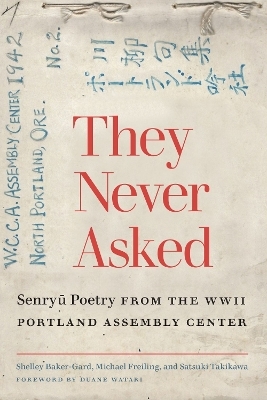
They Never Asked
Senryu Poetry from the WWII Portland Assembly Center
Seiten
2023
Oregon State University (Verlag)
978-0-87071-235-7 (ISBN)
Oregon State University (Verlag)
978-0-87071-235-7 (ISBN)
The poems collected here were written by twenty-two poets, who produced hundreds of poems whilst detained in the Portland Assembly Center. Individually, the poems reflect the thoughts and feelings the authors experienced while being detained in the Center; collectively, they reflect the resilience and resistance of a community denied freedom.
In 1942, after the passage of Executive Order 9066, Japanese families were removed from their homes in Oregon and the Yakima Valley and sent to the Portland International Livestock Exposition Center, where they were housed in converted animal stalls. The Wartime Civil Control Administration kept internees at the Portland Assembly Center until September 1942, when they were transferred to newly built permanent internment camps at Minidoka, Heart Mountain, and Tule Lake.
The Japanese American communities in Oregon and southern Washington were relatively small and many of the detainees knew each other; they drew on existing family and community networks to help each other through the long summer, living in inhumane conditions under the constant threat of violence. Several members of Bara Ginsha, a Portland poetry group, decided to continue their work while incarcerated, primarily by writing senryū, a type of Japanese poetry related to haiku.
They Never Asked is a collection of work produced by Bara Ginsha members in the WCCA camp, based on a journal kept by Masaki Kinoshita. The senryū collected here were written by a group of twenty-two poets, who produced hundreds of poems. Individually, the poems reflect the thoughts and feelings the authors experienced while being detained in the Center; collectively, they reflect the resilience and resistance of a community denied freedom. Editors Shelley Baker-Gard, Michael Freiling, and Satsuki Takikawa present translations of the poems alongside the originals, supplemented by historical and literary context and a foreword by Duane Watari, Masaki Kinoshita’s grandson.
In 1942, after the passage of Executive Order 9066, Japanese families were removed from their homes in Oregon and the Yakima Valley and sent to the Portland International Livestock Exposition Center, where they were housed in converted animal stalls. The Wartime Civil Control Administration kept internees at the Portland Assembly Center until September 1942, when they were transferred to newly built permanent internment camps at Minidoka, Heart Mountain, and Tule Lake.
The Japanese American communities in Oregon and southern Washington were relatively small and many of the detainees knew each other; they drew on existing family and community networks to help each other through the long summer, living in inhumane conditions under the constant threat of violence. Several members of Bara Ginsha, a Portland poetry group, decided to continue their work while incarcerated, primarily by writing senryū, a type of Japanese poetry related to haiku.
They Never Asked is a collection of work produced by Bara Ginsha members in the WCCA camp, based on a journal kept by Masaki Kinoshita. The senryū collected here were written by a group of twenty-two poets, who produced hundreds of poems. Individually, the poems reflect the thoughts and feelings the authors experienced while being detained in the Center; collectively, they reflect the resilience and resistance of a community denied freedom. Editors Shelley Baker-Gard, Michael Freiling, and Satsuki Takikawa present translations of the poems alongside the originals, supplemented by historical and literary context and a foreword by Duane Watari, Masaki Kinoshita’s grandson.
Shelley Baker-Gard has degrees in anthropology and communications and is the current Haiku Society of America Coordinator for Oregon. She has been writing English haiku and senryū for many years and has been published in several literary journals, including Frogpond. Michael Freiling.works as a data scientist. He studied poetry with David Ferry at Wellesley, and helped co-found MIT’s literary magazine Rune. After earning his PhD, he was a Luce Scholar at Kyoto University, where he completed a translation of the Heian Period anthology Hyaku Nin Isshu. Satsuki Takikawa holds a degree in German literature from Sophia University in Tokyo and has taught English and German at schools in Kyoto and Sakai.
| Erscheinungsdatum | 11.07.2023 |
|---|---|
| Übersetzer | Shelley Baker-Gard, Michael Freiling, Satsuki Takikawa |
| Zusatzinfo | 29 black and white illustrations |
| Verlagsort | Corvallis, OR |
| Sprache | englisch |
| Maße | 152 x 229 mm |
| Themenwelt | Literatur ► Anthologien |
| Literatur ► Lyrik / Dramatik ► Lyrik / Gedichte | |
| Geschichte ► Allgemeine Geschichte ► 1918 bis 1945 | |
| Geschichte ► Teilgebiete der Geschichte ► Militärgeschichte | |
| Geisteswissenschaften ► Sprach- / Literaturwissenschaft ► Anglistik / Amerikanistik | |
| Geisteswissenschaften ► Sprach- / Literaturwissenschaft ► Literaturwissenschaft | |
| ISBN-10 | 0-87071-235-7 / 0870712357 |
| ISBN-13 | 978-0-87071-235-7 / 9780870712357 |
| Zustand | Neuware |
| Haben Sie eine Frage zum Produkt? |
Mehr entdecken
aus dem Bereich
aus dem Bereich
ein Psychologe erlebt das Konzentrationslager
Buch | Hardcover (2024)
Kösel (Verlag)
CHF 30,80
Mythos „Stauffenberg-Attentat“ – wie der 20. Juli 1944 verklärt und …
Buch | Hardcover (2024)
Goldmann (Verlag)
CHF 33,55


